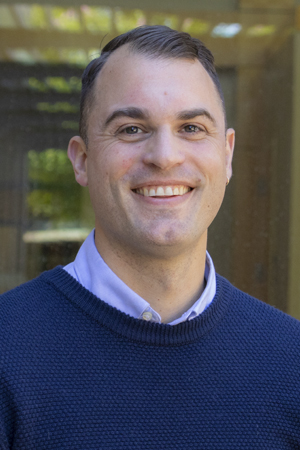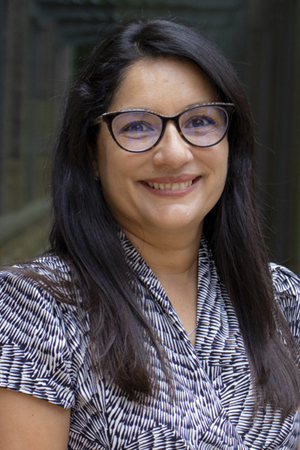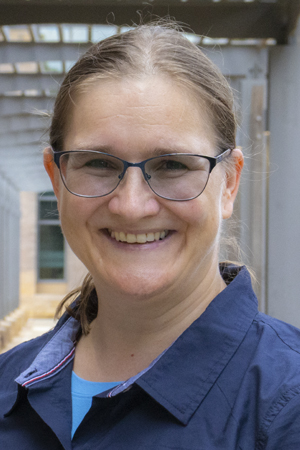Research Team - (T-PAL)
-
 Principal Investigator
Principal InvestigatorDavid Hessl, Ph.D.
David Hessl, Ph.D., is currently the director of the Translational Psychophysiology and Assessment Laboratory (T-PAL). His research focuses primarily on genetic, brain, environmental and neuroendocrine factors affecting cognition and behavior in individuals with fragile X-associated disorders. One important focus of the work in T-PAL is to develop and evaluate novel behavioral, cognitive and psychophysiological outcome measures of individuals with neurodevelopmental disabilities. These measures are designed to be used to detect improvement in functioning within controlled treatment trials. Psychophysiological studies have examined abnormalities in social gaze, sensorimotor gating, sympathetic nervous system activity, hypothalamic-pituitary-adrenal axis function, and potentiated startle responses. Other recent studies have been aimed at improving aberrant behavior and cognitive measurements in individuals with fragile X syndrome, Down syndrome, autism, intellectual disabilities, and other neurodevelopmental disabilities. A second major focus of his work is the study of premutation carriers of fragile X syndrome. As children these individuals are at increased risk for attention deficit hyperactivity disorder and autism and as older adults they become at risk for a neurodegenerative disease involving tremor, ataxia, and dementia (the fragile X-associated tremor ataxia syndrome, FXTAS). Along with Susan Rivera, Ph.D., he directs an NIMH-funded project examining the trajectory of changes over time in brain structure, neuropsychology, and neurological/motor functioning in these FMR1 premutation carriers.
He earned his Ph.D. in clinical psychology from the University of Washington where his work focused on emotional and brain development in infants of depressed mothers under the supervision of Geraldine Dawson, Ph.D. He went on to a clinical internship at the Department of Psychiatry and Behavioral Sciences and the Lucile Packard Children's Hospital at Stanford University. He also completed a MacArthur postdoctoral fellowship in psychophysiology under the supervision of W. Thomas Boyce, M.D. at the Institute of Human Development at UC Berkeley. His training continued at the Behavioral Neurogenetics Research Center at Stanford where he began his work on gene-brain-behavior studies in fragile X syndrome with Allan Reiss, M.D. He obtained an NIMH Career Development Award (K23) to examine the association between anxiety and autism symptoms in children with fragile X syndrome and the physiology underlying social anxiety problems such as gaze avoidance in these individuals. He is a licensed psychologist and his clinical interests involve cognitive, emotional, and behavioral evaluation of children, adolescents and adults with neurodevelopmental disorders, including fragile X syndrome, autism spectrum disorders, ADHD, learning disabilities, and Tourette syndrome. He conducts collaborative studies with researchers from several disciplines, including neuroscience, molecular genetics, and neuropathology in an effort to understand links between genetics, brain function and behavior.
-
 Postdoctoral Scholar
Postdoctoral ScholarAndrew Dakopolos, Ph.D., M.A., M.S.
Andrew Dakopolos, Ph.D., is postdoctoral scholar in the T-PAL lab, primarily working on the Cognitive Test Battery for Intellectual Disabilities (Toolbox) Study. Andy received his Ph.D. from Teachers College, Columbia University with a focus in Intellectual Disability and Autism. He also holds an M.S. in Applied Statistics from Teachers College, as well as an M.A. in Teaching from Willamette University. Andy’s background is in education, and he has over 10 years of experience teaching special education and working with graduate-level special education teacher candidates in Oregon, Los Angeles, New York City, and San Francisco. His research interests include cognitive measurement and assessment, executive function, emotion regulation, and early social communication in children with autism and other developmental and intellectual disabilities.
-
 Clinical Research Coordinator
Clinical Research CoordinatorGlenda M Espinal, B.S. CCRC
Glenda Espinal is the clinical research coordinator for the Longitudinal Study of Brain and Cognition in Fragile X Premutation Carriers and also manages the International Fragile X Premutation Registry. She has worked in the fragile X-related research field for the past 11 years focusing on the pathogenic mechanisms that cause fragile X syndrome and fragile X-associated tremor/ataxia syndrome (FXTAS). Her research interests include the effects of intellectual function, motor function, executive function, memory, dexterity, and balance on neurodevelopment in premutation carriers.
-
 Assistant Clinical Research Coordinator
Assistant Clinical Research CoordinatorPari Mungalpara, B.S.
Pari Mungalpara is the clinical research coordinator for the Longitudinal Study of Brain and Cognition in Fragile X Premutation Carriers. She brings a strong foundation in neurodevelopmental research from her time at the University of Washington, where she explored sleep and brain structure in autistic children. Her research interests include neuroimaging techniques and psychological assessments to investigate how brain function relates to behavior in individuals with neurodevelopmental disabilities.
-
 Assistant Researcher
Assistant ResearcherAndrea Schneider, Ph.D.
Andrea Schneider, Ph.D., is an Assistant Researcher at the University of California at Davis, MIND Institute. From very early on in her academic career, she focused on interdisciplinary research with brain-behavior interactions and acquired broad knowledge in clinical psychology and medical neuroscience, with specific training and expertise in ADHD, learning disabilities, and fragile X. As a graduate student, she studied the neurophysiological bases of ADHD (attention-deficit and hyperactivity-disorder) and dyslexia. Being also a clinical psychologist, her other area of interest is intervention research. She completed a pilot study of a phytopharmacological intervention (Ginkgo biloba) in dyslexia, and a study about the efficacy of neurofeedback in ADHD. Currently, her main research interest is the association between genetic and brain abnormalities underlying the neuropsychopathology, behavioral, and psychiatric symptoms in individuals with the fragile X mutations and the development of EEG as an outcome measure for targeted treatment trials. She is an active member of the Social Skills Program at the MIND Institute since 2008. She is an affiliate of the ARTP (Autism Research and Treatment) program at the MIND Institute, a member of the FENS (Federation of European Neuroscience Society), and the Center for Cognitive Studies, University Potsdam, Germany.

